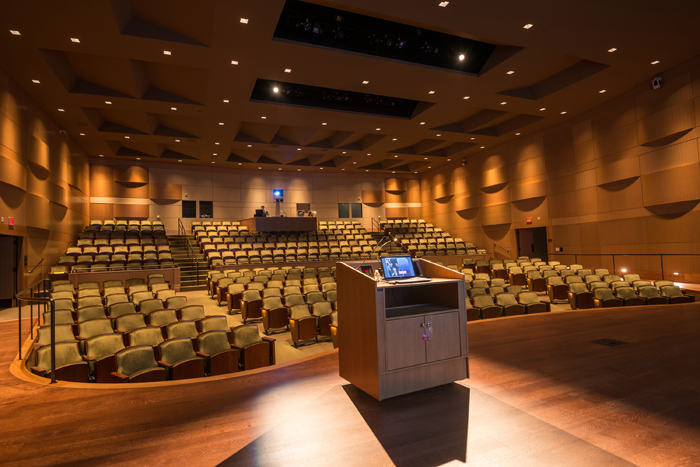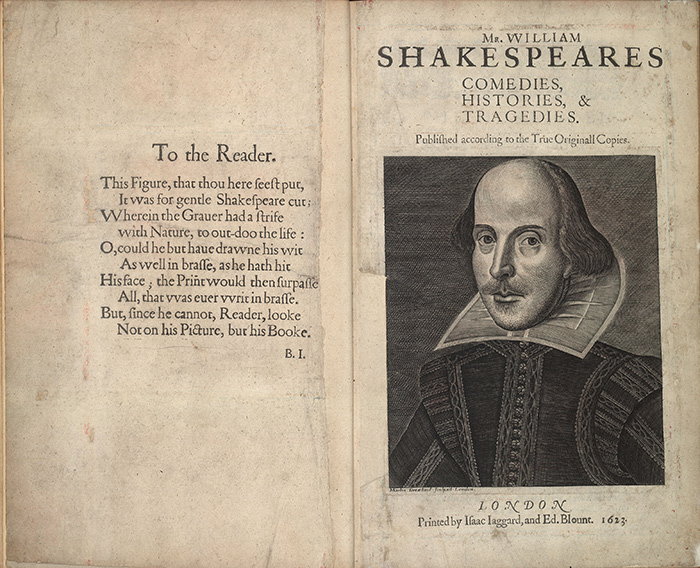
Shakespeare’s Comedies, Histories, and Tragedies, known as the First Folio, published in London in 1623. The poem on the left is by Ben Jonson, Shakespeare's contemporary and fellow playwright. The Huntington Library, Art Collections, and Botanical Gardens.
“All the world’s a stage,” declares Jaques in William Shakespeare’s play As You Like It. While that may be true, there’s something to be said for an auditorium with a beautiful stage, state-of-the-art acoustics, raked seating, and clear sight lines.
With the opening earlier this month of the Steven S. Koblik Education and Visitor Center, The Huntington has gained an elegant, comfortable new space for lectures, conferences, and performances. Called Rothenberg Hall, it features the 400-seat Robert C. Ritchie Auditorium, which has exceptional acoustics and superb audiovisual capabilities.
The Huntington’s W. M. Keck Foundation Director of Research, Steve Hindle, is excited to host his first conference in the new digs. “One of the characteristics of a successful conference is its capacity to encourage spontaneous interaction among scholars,” says Hindle. He’s looking forward to experiencing how the intimate feel of the new auditorium, coupled with superior acoustics, inspires thoughtful and spirited debate.
First up on the conference slate is a two-day exploration of the Bard himself. Running today and tomorrow, “Rethinking Shakespeare in the Social Depth of Politics” (April 17–18, 2015) brings together a dozen scholars to discuss the nature and significance of popular political activity in Shakespeare’s works.
“On the surface, Shakespeare seems to accept the hereditary monarchy and authoritarian doctrines of the Tudor period,” says conference convener Chris Fitter, professor of English at Rutgers University. But Fitter says that in plays such as Coriolanus and Henry VI, Part 2, Shakespeare’s interrogation of power and authority reveals a courageous sympathy with the fears and stresses of England’s underclass. Fitter cites a line in Henry VI, Part 2, in which William de la Pole, the 1st Duke of Suffolk, laments that ‘the commonwealth hath daily run to wrack,’ alluding to hyper-taxation, a bankrupting overseas war, a chronically vacillating monarchy, and nobles who literally tear up the complaints of illegally dispossessed peasants.
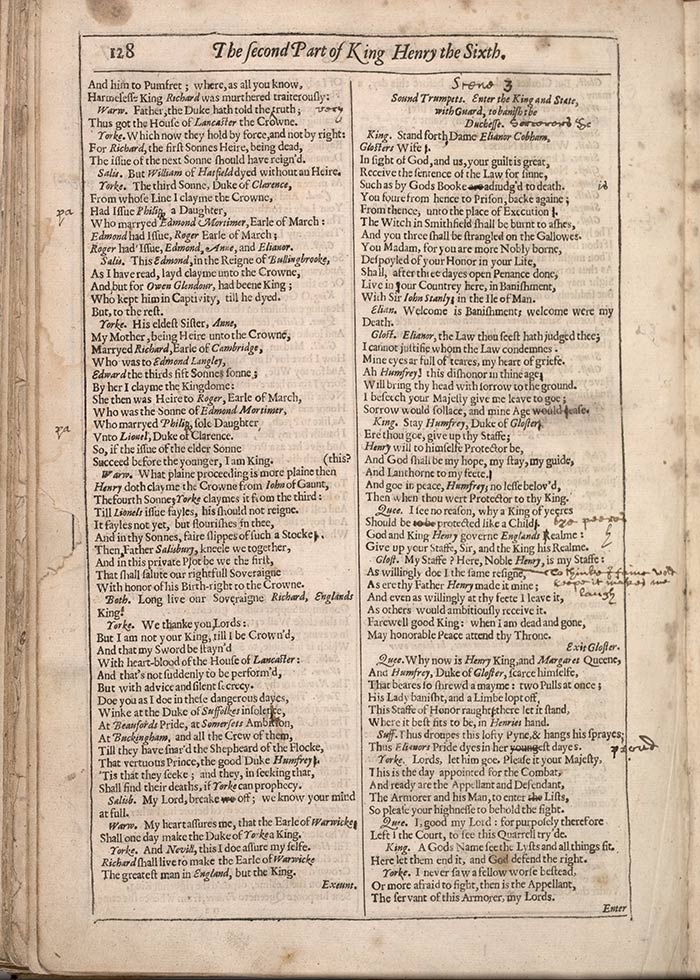
This page from Henry VI, Part 2, comes from The Huntington’s copy of the Second Folio, published in 1632. The Huntington Library, Art Collections, and Botanical Gardens.
The Bard is also the focus of three other events taking place at The Huntington:
On Saturday, April 18, visitors can catch scenes from some of Shakespeare’s best-known plays, set against the backdrop of the The Huntington’s stunning grounds. The Independent Shakespeare Co. will be on site for “Shakespeare in the Gardens,” a family-friendly event from 11 a.m to 3 p.m. The program will include interactive workshops and craft activities that explore Shakespeare and his world.
Then on Thursday, May 7, artists from L.A. Opera join actors from the Independent Shakespeare Co. for “Shakespeare Scenes and Sonnets: An Evening of Words and Music.” They will perform in the Huntington Art Gallery, surrounded by 18th-century Grand Manner portraits, presenting scenes, sonnets, and songs that explore connections between Shakespeare’s works and treasures from The Huntington’s collections.
On June 6 at 7 p.m., the Independent Shakespeare Co. will take the stage in Rothenberg Hall for a production of Shakespeare’s rarely performed play Pericles. The fantastic story includes shipwrecks, pirates, an abandoned baby, a long-lost wife, and a knight in rusted armor fighting for love. By turns lyrical and rough, the sprawling play was wildly popular in Renaissance England.
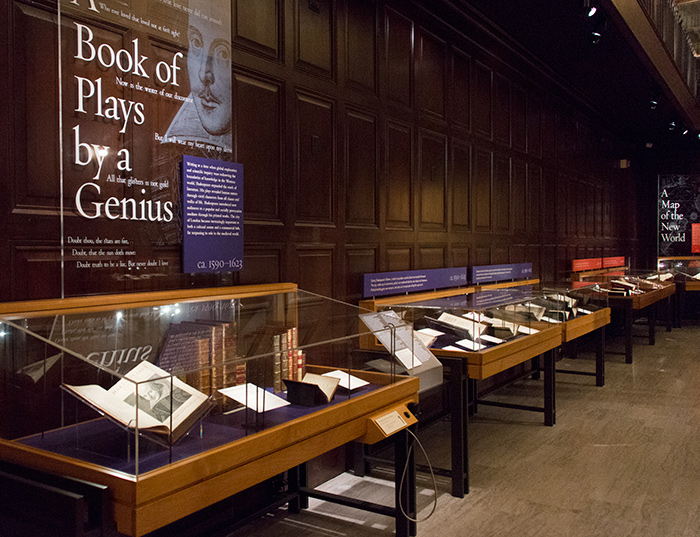
One of the 12 sections of the Library Main Exhibition Hall’s permanent display, “Remarkable Works, Remarkable Times,” celebrates Shakespeare.
The Huntington holds one of the most important collections of Shakespeare’s materials in the nation, including a copy of the First Folio (1623), the most reliable source for 36 of his plays. The Huntington also has two of the four quarto editions of his Hamlet, one of which is on display alongside the First Folio in the Library’s Main Exhibition Hall.
Lovers of all things Shakespearen are in the midst of a mega-celebration of the renowned playwright’s key anniversaries. Shakespeare’s birthday will be celebrated next week, on April 23. (Shakespeare was baptized April 26, 1564, and scholars have long believed that he was born three days earlier on April 23. Ironically, he died on the same date 52 years later, in 1616.) Last April 23 was the 450th anniversary of his birth, and that date next year marks the 400th anniversary of his death.
The Huntington salutes the works of this immortal genius who “was not of an age,” as his contemporary and fellow playwright Ben Jonson wrote, “but for all time.”
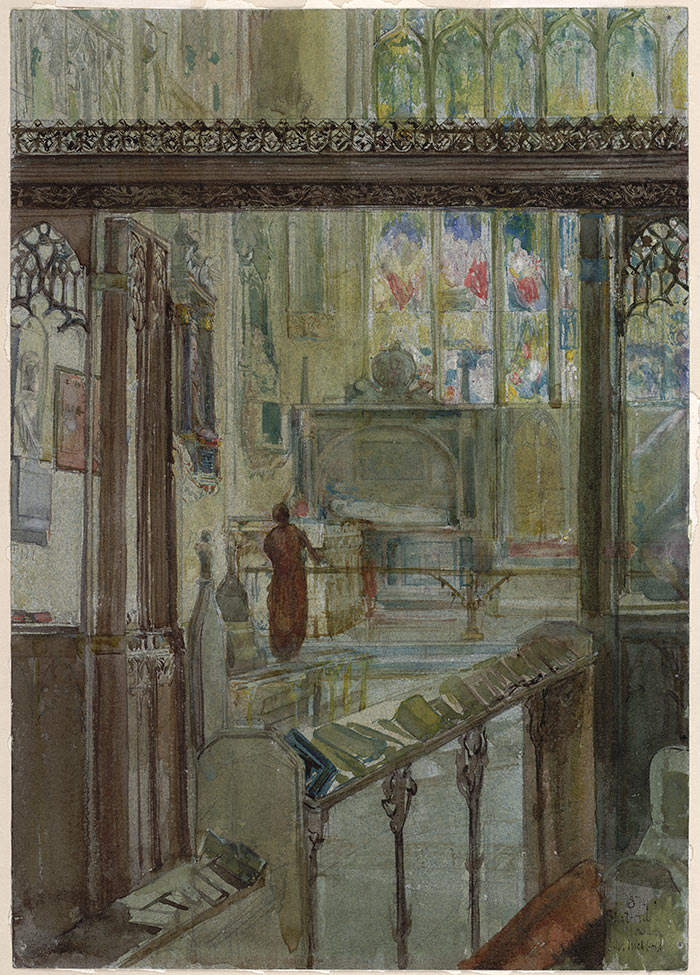
Shakespeare’s Tomb, an 1874 watercolor over pencil drawing by English painter John Inchbold (1830–1888), shows the Holy Trinity Church, where Shakespeare is buried, in Stratford-upon-Avon, Warwickshire, United Kingdom. The Huntington Library, Art Collections, and Botanical Gardens.
“Rethinking Shakespeare in the Social Depth of Politics” takes place April 17–18 in Rothenberg Hall. “Shakespeare in the Gardens" happens on Saturday, April 18, from 11 a.m to 3 p.m, and is free with admission. “Shakespeare Scenes and Sonnets: An Evening of Words and Music,” on Thursday, May 7, at 7:30 p.m. costs $50 for Members and $60 for Non-Members; tickets are available online or by phone at 800-838-3006. The performance of Pericles on June 6 at 7 p.m. costs $35 for Members and $45 for Non-Members. Tickets are available through brownpapertickets.com or 800-838-3006.
Diana W. Thompson is senior writer for the office of communications and marketing at The Huntington.

